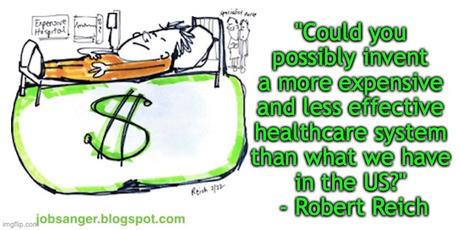
Obamacare improved the healthcare system of the United States, but it stopped far short of actually fixing all the problems of healthcare in the country. Medical Care is still too expensive, even for those lucky enough to have health insurance, and millions are still left with no health insurance at all (which effectively denies them life-saving preventative care).
Here is part of what Robert Reich has to say about it:
Even before the pandemic, the typical American family was spending more than $6,000 a year on health insurance premiums. Add in copayments and deductibles that doctors, hospitals, and drug companies also charge, and that sum rises to $6,400. Add in typical out-of-pocket expenses for pharmaceuticals, and it’s at least $6,800. That’s not all, because some of the taxes the typical family pays are for health insurance, too — for Medicare and Medicaid and the Affordable Care Act. Add them in, and the typical household pays $8,975 a year for health insurance. This number doesn’t include what typical workers’ employers spend on their health insurance – which might otherwise go to their wages.
American spending on healthcare per person is more than twice the average in the world’s other thirty-five advanced nations. Yet the United States ranks near the bottomamong advanced nations for life span and infant mortality. Americans are sicker, our lives are shorter, and we have more chronic illnesses. Canadians, for example, can expect to live on average almost four and a half years longer than Americans, even though health care spending per person is only about half as high as in the U.S.
Healthcare is so expensive that many Americans put off seeing a doctor until their health has seriously deteriorated. Even with the Affordable Care Act, some 30 million Americans have no health insurance coverage at all
Not only do too many dollars go to super-specialists and too few to preventive generalists, but the administrative costs involved in private for-profit insurance are humongous. About a third of what the typical American pays for health insurance goes to the people who oversee billing and collections. And then of course there are marketing and advertising expenses, and the profits that go to shareholders or private-equity managers.
Finally, if the pandemic taught us anything, it’s that we need to decouple health insurance from employment. Losing a job shouldn’t mean the loss of a family’s lifeline to healthcare.
The Affordable Care Act was a good start at reform, but today I’m urging Congress to replace private for-profit health insurance with Medicare for all. This would lead to far lower total costs — including premiums, co-payments, deductibles, and taxes — and it would cover all Americans. People could keep their same doctor or other health-care provider, and could buy private insurance to supplement it — just as some people now buy private insurance to supplement Medicare and Social Security. But as Medicare and Social Security have demonstrated, we shouldn’t need to pay private for-profit insurers boatloads of money to get the insurance we need.
I have no illusions this will happen soon. But the road we’re now on is unsustainable — economically, politically, and socially. Eventually, we’re going to have some version of Medicare for All (and hats off to members of Congress who are leading the way, such as Representatives Pramila Jayapal, Debbie Dingel, and Ro Khanna). The question is how much unnecessary cost and hardship must we bear before we do?

